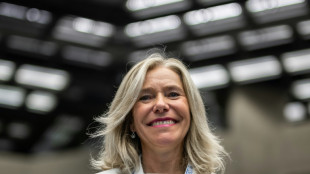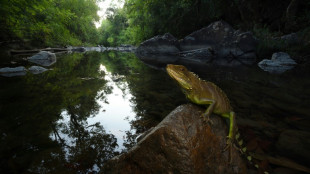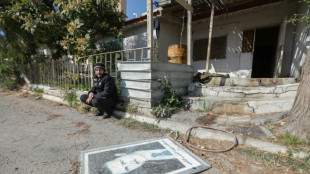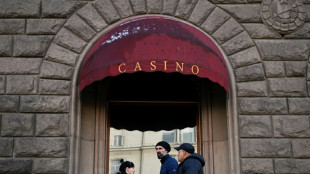
-
 Global green energy push likely to continue despite Trump climate retreat: UN
Global green energy push likely to continue despite Trump climate retreat: UN
-
Shooting, explosions in Jenin as Israel presses raid

-
 Spotlight on risk management as skiers tackle notorious Kitzbuehel downhill
Spotlight on risk management as skiers tackle notorious Kitzbuehel downhill
-
Rare wildlife species found in Cambodian national park

-
 EU Russia hawks back Trump call to boost defence spending
EU Russia hawks back Trump call to boost defence spending
-
Trump puts US govt diversity workers on leave, calls bishop 'nasty'

-
 Semi-finalist Shelton 'shocked' by 'embarrassing' Melbourne TV hosts
Semi-finalist Shelton 'shocked' by 'embarrassing' Melbourne TV hosts
-
Sinner races into semis as Swiatek closes on first Melbourne crown

-
 Syria's military hospital where detainees were tortured, not treated
Syria's military hospital where detainees were tortured, not treated
-
Prince Harry settles lawsuit against Murdoch's UK tabloids

-
 Sinner demolishes De Minaur to set up Melbourne semi with Shelton
Sinner demolishes De Minaur to set up Melbourne semi with Shelton
-
Stock markets diverge tracking Trump plans

-
 Sudan 'political' banknote switch causes cash crunch
Sudan 'political' banknote switch causes cash crunch
-
Malaysia's Anwar says don't single out China in sea tensions

-
 EU's top diplomat backs Trump call to boost defence spending
EU's top diplomat backs Trump call to boost defence spending
-
Simmering anger as Turkey begins burying 76 fire victims

-
 Masa Son, Trump's Japanese buddy with the Midas Touch
Masa Son, Trump's Japanese buddy with the Midas Touch
-
Borussia Dortmund sack Sahin after Champions League setback

-
 US govt workers in diversity jobs to be put on leave as programs ordered shut
US govt workers in diversity jobs to be put on leave as programs ordered shut
-
Shelton grinds past Sonego into Australian Open semi-final

-
 Borussia Dortmund sack coach Nuri Sahin after Champions League setback
Borussia Dortmund sack coach Nuri Sahin after Champions League setback
-
Markets rise after Trump AI pledge but China tariff fears return

-
 'Did not push hard enough': Navalny lawyer speaks of regrets
'Did not push hard enough': Navalny lawyer speaks of regrets
-
Bulgaria court ruling turns spotlight on gambling addiction

-
 Inoue focused on Korean with bright lights of Vegas on horizon
Inoue focused on Korean with bright lights of Vegas on horizon
-
Mauricio Funes: journalist turned El Salvador president

-
 Navarro urges rule change after double-bounce furore in Melbourne
Navarro urges rule change after double-bounce furore in Melbourne
-
Asian traders cheer Trump AI pledge but China tariff woes return

-
 Lesotho's king pitches green energy to Davos elites
Lesotho's king pitches green energy to Davos elites
-
Buttler rejects calls for England to boycott Afghanistan match

-
 'I believe': Swiatek surges into Australian Open semi with Keys
'I believe': Swiatek surges into Australian Open semi with Keys
-
Indonesia rescuers search for survivors as landslide kills 19

-
 Triple-doubles for Jokic and James fuel lopsided NBA wins
Triple-doubles for Jokic and James fuel lopsided NBA wins
-
Five things about the 2025 World Rally Championship

-
 'Love for humanity': Low-crime Japan's unpaid parole officers
'Love for humanity': Low-crime Japan's unpaid parole officers
-
Indonesia rescuers search for survivors as landslide kills at least 17

-
 Trump targets opponents, faces criticism from cathedral pulpit
Trump targets opponents, faces criticism from cathedral pulpit
-
S. Korea to overhaul some airports after Jeju Air crash

-
 Resilient Keys 'really proud' to be back in Melbourne semis
Resilient Keys 'really proud' to be back in Melbourne semis
-
Bloodied Welsford fights back from crash to win another Tour stage

-
 Swiatek sweeps into Melbourne semis, Sinner faces home test
Swiatek sweeps into Melbourne semis, Sinner faces home test
-
Rampant Swiatek sweeps into Australian Open semi-final with Keys

-
 Lanterns light up southern Chinese city ahead of Lunar New Year
Lanterns light up southern Chinese city ahead of Lunar New Year
-
'Worst ever' Man Utd turn to Europa League as saving grace

-
 Brazil saw 79% jump in area burned by fires in 2024: monitor
Brazil saw 79% jump in area burned by fires in 2024: monitor
-
Resilient Keys beats Svitolina to reach Australian Open semi-finals

-
 Most Asian markets rise after Trump AI pledge but China tariff woes return
Most Asian markets rise after Trump AI pledge but China tariff woes return
-
Djokovic mentally ready for Zverev but worried about creaking body

-
 As Trump takes aim at EVs, how far will rollback go?
As Trump takes aim at EVs, how far will rollback go?
-
No home, no insurance: The double hit from Los Angeles fires


US to reopen consulate in Cuba, hit by 'sonic attacks'
The United States consulate, closed since 2017 following alleged "sonic attacks" against diplomatic staff, will resume a limited service issuing visas, its embassy in Havana said Thursday.
Washington reduced the US mission to the bare minimum five years ago when then-president Donald Trump accused Havana of carrying out "sonic attacks" targeting embassy staff.
US personnel and their families suffered from mystery illnesses subsequently known as "Havana Syndrome." Similar incidences later occurred at other embassies around the world.
A US government report in 2020 said the illnesses were most likely caused by "directed, pulsed radio frequency (RF) energy."
The consulate "will begin the limited resumption of some immigrant visa services, as part of a gradual expansion of the embassy's functions," said Timothy Zuniga-Brown, the charge d'affaires at the US diplomatic mission in Havana.
The consulate closure was a major blow for Cubans wishing to emigrate to the US as it obliged them to tackle numerous obstacles, among them being forced to travel to Colombia or Guyana to submit a request.
"There are a lot of people that want to leave who take a boat to go there (to the US) or through a third country," said Cuban pensioner Felipe Mesa, 75.
Zuniga-Brown said the consulate will only schedule appointments with people that have already presented complete document files. During the transition period, most requests will still have to be made in Guyana's capital Georgetown.
The consular service will also provide essential services to US citizens and emergency non-immigrant visas, he added.
- No warming of relations -
According to existing immigration agreements, the US should authorize 20,000 immigrant visas a year to Cubans.
With Cuba suffering its worst economic crisis in 30 years due to the coronavirus pandemic, most Cubans hoping to emigrate to the US have chosen to do so through the dangerous Central American route where migrants face exploitation by people smugglers.
"The visa services for migrants are a secure and legal way towards family reunification," said Zuniga-Brown, referring to families split between the two countries.
Political scientist Rafael Hernandez says the US failure to honor the migration agreement led to "a type of silent Mariel," in reference to the mass exodus of around 125,000 Cubans to the US in 1980.
He said the number of undocumented Cubans in the US rose from 21,000 in 2019 to 40,000 a year later.
The reduction in US diplomatic staff in Cuba reflected increased tensions between the two countries after Trump succeeded Barack Obama in the White House.
Trump put an end to the improving relationship that had seen Obama approve the re-establishment of bilateral diplomatic relations in 2015.
Many Cubans hoped the election Joe Biden -- Obama's former vice-president -- would improve things, but in vain.
This move "in no way represents a continuity of the Obama policy," said Hernandez, but rather a "rolling back of the atrocities committed" by Trump.
Michael Shifter, president of the Inter-American Dialogue think tank, agreed.
"It would be a mistake to interpret it as the beginning of a significant opening towards the island," he said.
With mid-term US elections due in November, "it is difficult to imagine there would be other changes" in current Washington policy towards Cuba, said Shifter.
The United States has regularly criticized Cuba's communist party leaders over the arrest and conviction of anti-government protesters who took to the streets in unprecedented demonstrations last July.
H.Gonzales--AT
